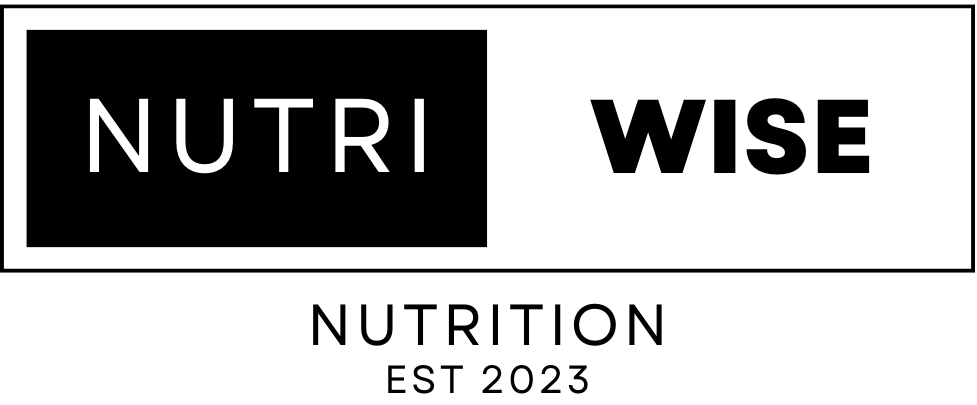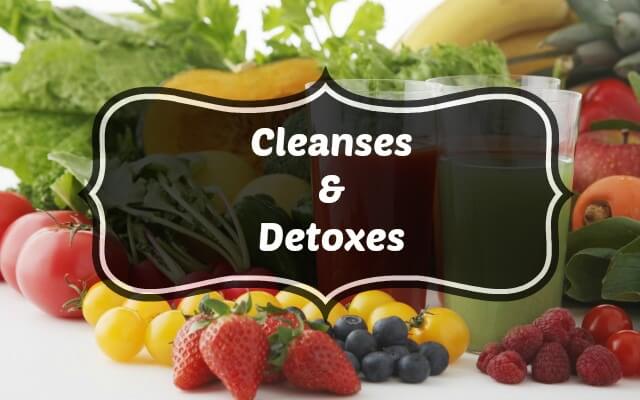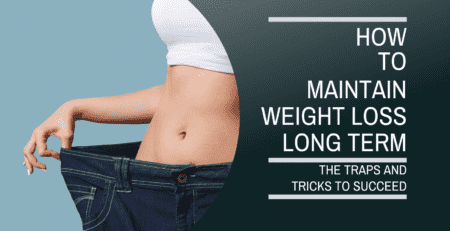Should You Do A Detox?
Should You Do A Detox?
Everyone is cleansing or doing a detox these days. Why wouldn’t you when they offer you the chance to do relatively little work to lose weight and feel great!?
There’s a problems with this whole thing though. Not just the concept, but the industry behind it and the pseudoscience that accompanies it. Too many questions go unanswered or are given vague answers. Some of these things I think are actually pretty important to know. Things like:
What is a toxin?
What is toxin accumulation and how does it occur?
Do I actually need to do a detox?
Why are there so many types?
How do they work and what do they actually do?
How can you explain the results?
Most importantly though, is it worth spending your hard earned money on?
So there are a few pretty big questions that go beyond the perceived health benefits of doing a detox or cleanse so lets look a bit further into them shall we?
The Logic
The logic these products use is pretty simple:
“Every day we are exposed to and ingest toxins. Over time these toxins accumulate in the body and cause as fat to be created to protect the body. Detoxing and cleansing allows the body to release these toxins and shed the fat, leaving you healthier and skinnier as a result”
Seems like a sound statement doesn’t it? You accumulate toxins through eating and being around them and they in turn make you fat.
Quite often it will be represented graphically as something like this:
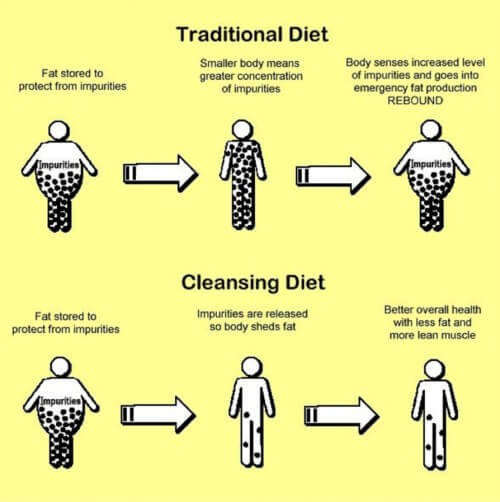
Or this:
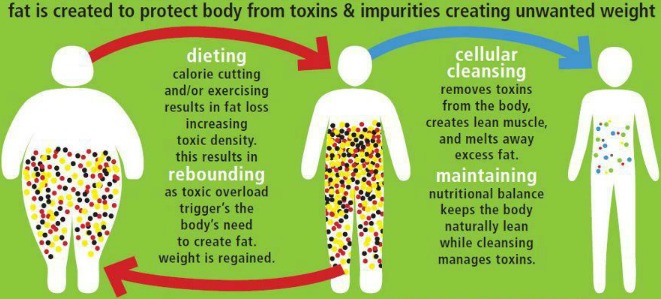
Note: Images have been edited to remove any company or personal branding.
Where the logic breaks down…
This is where the problem begins though. Believing that requires you ignore how the body works and have no understanding of what you’re eating. Its really pseudoscience at its best, attempting to fool you into spending money on a quick fix with less than optimal results. It is an attempt to make you look to them for the answer by preying on your insecurities and making you unnecessarily afraid of this evil thing within you causing you to stack weight on.
What is a toxin?
By definition a toxin is a poisonous substance produced within living cells or organisms that are poisonous to humans. Meaning you need to be able to produce it naturally – like venom in a snake or poison ivy for example.
Where this gets confusing (often on purpose) is when people include things like pesticides, BPA, food additives, drugs and alcohol and creating an umbrella term for anything bad that could possibly have come in to contact with your body.
Lets get something straight. Everything is toxic in the right dose. Even water. Your body has measures in place to stop a substance accumulating in your body at a toxic level. This measure is not the commonly perpetuated “create fat to protect myself” measure that many of these people claim to be true.
What is toxin accumulation and how does it occur?
Toxin accumulation is the term that most detox aficionado’s will throw around to describe the amount of toxins you have in your body. They will then link this with fat stored in the body.
The problem here again is that whilst its true that a substance can accumulate in the body, it completely ignores how the body naturally deals with them.
Did you know that your body rids itself of BPA through sweat? That’s not to say it causes you to sweat, it literally means that if you have ingested BPA’s through microwaving a crappy left over Chinese food container you’ll more than likely be sweating it out during your next session at the gym or on the next hot day.
Further to that, it also has been shown to remove heavy metals from the body as well.
So that’s two “toxins” (inverted commas because of the previously discussed umbrella term) already the body naturally deals with through one relatively simple mechanism. A mechanism so simple you didn’t even have to pay someone to do it…
Do you need to detox?
Yes, if you didn’t you’d die…But your body is already doing it whether you’re aware of it or not (see aforementioned sweating example).
The more relevant question is “Do you need a product to kick start your body detoxing or cleansing?”.
No. You really don’t.
If you pay attention to whats going in to your mouth, where you obtain your food and your activity levels the liver, kidneys, lungs, colon and several other organs all work together to rid the body of unwanted materials. The systems of the body are intricate, but very effective when properly fueled.
There is also plenty of evidence to suggest that the company who produced the product you’re planning on using couldn’t even name the toxin or toxins their product would target, the definition of the word “detox” or even show that their product actually worked.
Why are there so many types?
Good question. Mostly that’s to generate more money for the parent companies. That’s the same reason supplement companies produce 50 different versions of Whey protein… It’s just marketing to capture different audiences and sell the underlying product.
Companies specialising in detox products will try and do this by having specific products for specific organs like the liver, kidneys and bowel while others claim to detox the whole body.
Whilst there is some credibility in attempting to target an area of trouble there is little faith that they’re going to anything more than make you go to the toilet more. If that one area did have an issue, you could actually make it worse by “targeting” it as opposed to changing your lifestyle and eating habits – which your doctor will probably tell you to do anyway. But who needs doctors’s advice when a quick talking sales person can get you where you want to be in 2 weeks?
How do they work & what do they actually do?
The claim many of these products make is they will “detox and cleanse the body”. They don’t necessarily state they’ll allow you to lose weight or body fat. If you didn’t, they’d get sue’d for sure. This is why they use the umbrella terms of “detox and cleanse” – so they can hide behind the vague claim and a marketing campaign implying they’ll make a difference to your life.
For the most part the cleanse product will either give you an associated diet and exercise recommendation to follow in conjunction with starting to use their product or the product itself will be the diet. Most of these cleanses and detoxes involve some form of extreme caloric restriction. The Master Cleanse, for example, involves 6-12 glasses of a lemonade like concoction per day. This totals approximately 650 calories in a day. A normal healthy adult requires so much more than this, you can calculate yours here: https://www.eatforhealth.gov.au/node/add/calculator-energy
Its not the only cleanse or detox out there that ultimately uses an extreme caloric deficit, its just a great example. The Lemon Detox Diet was very similar (if not exactly the same).
So whats happening to your body when you do it?
Quite simply you’re burning up all the glycogen in your liver and muscles. Glycogen is used as energy by the body when blood sugar levels drop. Typically this is during exercise, but during a cleanse or detox its happens because you’re not eating and now glycogen is being used just to keep you going.
Glycogen depletion can occur anywhere from 24-48 hours in extreme caloric deficiency and with it can often come weakness, fatigue and dizziness. To add to this, when glycogen is stored in the body it requires water. Without glycogen you have no need for the water that was being used to retain it, so you lose that too.
After glycogen is depleted the liver will start converting fats to be used as energy through gluconeogenesis. This is often where the proponents of cleanses and detoxes jump for joy and start pumping their fists in the air because they knew they were right all along, but this process is incredibly inefficient at creating energy for the body to run on because only about 5-12% of a fat molecule can be used for energy. This means the person doing the detox, by this point, is running on the fumes of an oily rag and has no energy. Your body can adapt to this, however it can take a long time.
When the detox or cleanse is over the person typically goes back to eating normal food again and gains back their glycogen and water weight and in many circumstances gains more weight than they had previously due to the lowering of their BMR and subsequent overeating that ensues for many after completing a detox program. But their energy is back and comparatively now feel great.
How can you explain the results?
Glycogen + water depletion account for the majority of the weight lost over the period in question. The remainder comes from the drastic changes the individual has suddenly put in place such as not having a coke and pie for lunch. Many cleanses and detoxes implore you to eat more fruits and veges than you would normally as well, causing a slight change in the pH level of the blood (don’t get too excited about this, if it were out of whack too far in the first place you’d have other major issues) and an improvement in gut health and digestion as many include probiotics in the detox package. Other weight loss can include fat and muscle loss. However, the loss of muscle decreases your BMR and contributes to a “flabby” look which keeps many yoyoing on and off diets, detoxes and cleanses for years.
So is it worth my hard earned $$?

Nope. Just light the same amount of money on fire that you would have spent on it and we’ll call it even.
In health and fitness there are no quick fixes. You can’t undo 20 years of bad habits and poor nutrition in 2 weeks by malnourishing yourself.
Can you actually do anything to detox?
Sure! There are some very simple things you can do almost immediately to get all the proposed benefits of any cleanses/detoxes:
1. Increase your water intake
2. Increase your intake of vitamins and minerals through fruits and vegetables
3. Cut down on or cut out highly processed foods and soft drinks
4. Move and sweat more daily
5. Measure your caloric intake and eat enough overall
Do these five things and you’ll see the benefits in time, but remember the liver is the main organ that controls fat metabolisation in the body. Look after it and it will look after you.
